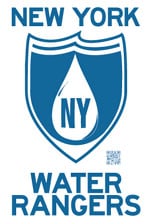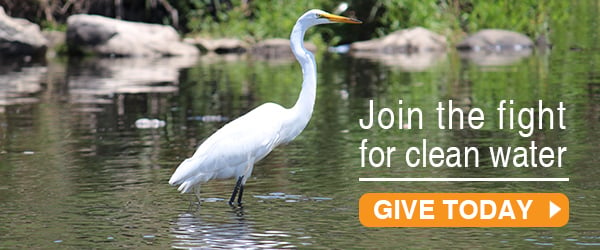ENVIRONMENTAL GROUPS LOOK FOR FURTHER IMPROVEMENT IN NYS’ REVISED FRACKING REVIEW

View more images on our Flickr site
CITIZENS CAMPAIGN FOR THE ENVIRONMENT, EARTHJUSTICE, EARTHWORKS OIL & GAS ACCOUNTABILITY PROJECT, ENVIRONMENTAL ADVOCATES OF NEW YORK, NATURAL RESOURCES DEFENSE COUNCIL, RIVERKEEPER
FOR IMMEDIATE RELEASE
For more information:
Erica Ringewald, Environmental Advocates, 518.210.9903
Sarah Eckel, Citizens Campaign for the Environment, 202.486.9007
Nadia Steinzor, Earthworks, 315.677.4111
Tina Posterli, Riverkeeper, 516.526.9371
AGENCY PROMISES ARE WELCOME, BUT PROTECTIONS MUST BE ENSURED BEFORE FRACKING IS PERMITTED
(ALBANY, NY)—Environmental groups remain uneasy about yesterday’s press release by the New York State Department of Environmental Conservation (DEC) of new recommendations to guide gas drilling and hydraulic fracturing or “fracking.” Top issues of concern include no mention of the cumulative impacts of fracking thousands of wells across the state, failure to treat toxic and potentially radioactive fracking wastewater and solid waste as hazardous waste, and an inadequate public comment period. The groups also noted anticipated improvements in the revised Supplemental Generic Environmental Impact Statement (SGEIS), including the state’s promise to issue regulations with rigorous controls of the gas development process. The organizations will be looking for a robust analysis of all impacts and alternatives in the forthcoming draft.
“Environmental Advocates of New York is eager to delve into the more than 900 pages of the state’s fracking review when it’s released to get a handle on how Governor Cuomo plans to stay true to his word and keep all of New York’s watersheds ‘sacrosanct,’” said Katherine Nadeau, Water & Natural Resources Program Director for Environmental Advocates of New York.
“The DEC’s press release demonstrates that Governor Cuomo recognizes the inherent risks to air, land, water, and people from hydro-fracking,” said Sarah Eckel, Legislative & Policy Director for Citizens Campaign for the Environment. “The press release outlined sensible protections, but every New Yorker has a right to live in a healthy environment and CCE remains concerned about vulnerable communities.”
“By improving the SGEIS, the DEC seems to recognize that industrial gas development can have a severe impact on the environment, health, and communities,” said Nadia Steinzor of Earthworks Oil & Gas Accountability Project. “But strong regulations and the means to enforce them must be in place before more drilling is allowed, and all New Yorkers must be equally protected.”
“Establishing some off-limit areas is a very important step,” said Earthjustice attorney Deborah Goldberg. “But DEC has yet to show that the risks to water, air, and public health in the other 85 percent of the Marcellus Shale zone are acceptably low. No drilling should be permitted until regulations are in place that protect the environment and all of the people of this State.”
Paul Gallay, President and Hudson Riverkeeper stated, “Riverkeeper is encouraged by the State DEC’s proposal to exclude the NYC Watershed and other areas of the Marcellus Shale from fracking. However, 85% of the communities within the New York section of the Marcellus still face serious dangers from fracking, which has caused untold damage in towns from West Virginia to Wyoming. The environmental community – especially those who are appointed to the DEC’s advisory panel – must do its part to make sure that no fracking occurs anywhere in New York unless truly rigorous and absolutely effective regulations are in place, backed by a full complement of inspectors and enforcement
personnel – paid for by industry but reporting to DEC – to assure those regulations are strictly obeyed. The issues of socio-economic and cumulative impacts must also be fully and aggressively dealt with by the state before moving forward.”
In response to the press release/summary distributed on June 30, 2011, the organizations noted the following:
- The press release does not mention a big picture analysis of how natural gas exploration and fracking will impact New York State. The 2009 draft assessed risk on a well-by-well basis, without considering the fact that up to 2,000 wells may be drilled each year. The cumulative impact of such activity is enormous. The failure to assess cumulative impacts could devastate our air and water quality.
- The release provides scant detail about how the millions of gallons of fracking wastewater and pounds of solid waste will be treated and to what degree. Fracking waste is hazardous waste and should be subject to existing hazardous waste regulations for its treatment, transport and disposal.
- The proposed comment period of 60 days is inadequate. A document of this scope should have a comment period of at least 180 days with multiple opportunities for public comment and several public hearings throughout the state.
Regulations
The organizations are encouraged by the DEC’s promise to issue regulations that transform the recommendations into transparent and enforceable law. However, based on information released late yesterday, questions remain regarding the scope and timing of these regulations. The groups remain concerned about whether drilling permits will be issued prior to the conclusion of a regulatory process.
The organizations anticipate having additional feedback on the revised SGEIS following a comprehensive review of the 900+ page document.
To frack a gas well, millions of gallons of water, sand, and toxic chemicals are pumped deep underground at high pressure. This fractures the rock that has trapped the gas for millennia and allows it to escape. From start to finish, gas development that relies on fracking is an industrial process that threatens our water. State after state, from Wyoming to Pennsylvania, has documented its dangers. New York can’t afford to put short-term gas profits ahead of the long-term health of our water and our communities.
The groups look forward to reviewing the full draft SGEIS and providing further comment on the improvements and omissions therein. The organizations also look forward to working with Governor Cuomo to ensure that if drilling is to be permitted in New York, it is done with all necessary regulatory protections in place.
-30-
The New York Water Rangers campaign is supported by a network of organizations working to protect the rights and health of New Yorkers and one of our most precious environmental resources—water—from the dangers of irresponsible, poorly regulated, and under-inspected natural gas exploration and development. The campaign is supported by Catskill Mountainkeeper, Citizens Campaign for the Environment, Earthjustice, EARTHWORKS Oil & Gas Accountability Project, Environmental Advocates of New York, Natural Resources Defense Council, and Riverkeeper. Visit www.CleanWaterNotDirtyDrilling.org to learn more.

